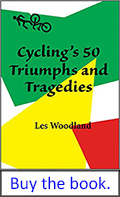

Gino Bartali & Fausto Coppi
by Owen Mulholland

Les Woodland's book Cycling's 50 Triumphs and Tragedies: The Rise and Fall of Bicycle Racing's Champions is available as an audiobook here. For the print and Kindle eBook versions, just click on the Amazon link on the right.
Owen Mulholland writes:
Greg LeMond was relieved to terminate the 1986 season a little early. Professional bike racing is hard enough, but the constant intrigue with his so-called teammate, Bernard Hinault, has been even more wearing. By some quirk of cycling fate it seems that most "grands" have stood alone. True contests between equals have been relatively rare. That is why the Tours of 1985 and '86 will be remembered forever. The victors have needed more than strong legs.
Yet, as painful and magnificent as these last two years have been for Bernard and Greg, their rivalry never reached the proportions of Gino Bartali and Fausto Coppi. For duration, intensity, and partisanship it seems doubtful that any other such confrontation will ever take place.

Gino Bartali and Fausto Coppi
In 1939 Bartali was the established number one. After just four years in the professional ranks he had won the Tours of Italy and France as well as numerous classics. Not only was his record impressive, but so was his style of riding. He would win sprints when necessary, but what really hot-wired his fans was the way he could destroy the opposition with devastating bursts in the mountains.
For most of his career Bartali used an early Campagnolo gear-changing mechanism that necessitated loosening the rear wheel, pedalling backwards to move the chain to the desired cog, moving the wheel back to take up chain slack, and then tightening the rear wheel. Bartali could manipulate the levers on the right seat stay and effectuate the gear change in a relative flash, but even he didn't like shifting gears too often. When he made this complex manuever in the mountains it was a sign to all that he wouldn't be seen again until the finish.
During the 1939 season a young "independent" rider (a class between amateur and professional) had impressed Gino and the directors of his Legnano team. They didn't hesitate to sign up the hot young prospect from Novi Ligure, a skinny 19 year old kid named Fausto Coppi.
From the beginning Coppi had a quiet assertiveness that a normal "gregario" would never dare to show. Questions over the dinner table, a certain sense of personal pride--these were the types of hints that Bartali completely overlooked. No ordinary team member would have dreamed of challenging the boss.
Much to the Tuscan's (Gino was born near Florence) chagrin, the kid showed his stuff in the Tour of Italy. While war raged across northern Europe, Italians were more concerned with the fratricide within their borders.
Severely injured early in the race, Gino lumbered on, driven by pure will power. Numerous attacks followed, leaving the team director, Pavesi, in a bind. On the one hand he wanted to support Bartali, but on the other hand he needed to supply a winner. The situation didn't rest in doubt for long. Pavesi made face to Bartali that appeared to say, "Coppi should stay where he is." Then he turned to Coppi and made another facial gesture that screamed, "Attack!"
Fausto needed no further encouragement. He went on the offensive, gaining second overall that day and later taking the coveted "maglia rosa," with the full support of Bartali.
There could be no denying it, Italy now had two "campionissimi". An unspoken peace pact existed until the Tour of Emilia the following season. These national classics were all the Italians had during the war. Understandably, they took on the stature formerly enjoyed by the select handfull of international classics. Furthermore, these domestic classics comprised a points series that counted towards the award of the Italian National Championship. Gino had won it in 1940 and very much wanted to repeat his success in '41.
The night before the race the team gathered in Gino's room for the usual pre-race discussion of tactics. Coppi opened with the request that, "I would like to attack from the start. I don't have very good form and am a little sick. I hope to make an effort you (Bartali) can profit from. This way you can warm up easily and follow the chase. After a short escape, I plan to quit."
"I don't see any problem with that," Bartali replied.
But things went a little differently. Coppi escaped alright, and stayed escaped all the way to the finish.
Gino demanded furiously at the end, "So you don't have any form?"
"But no one chased me."
"You could have quit."
"But I wasn't sick anymore. The race made me feel good!"
"Thanks for the explanation," Gino responded sarcastically. On the way out of Fausto's room he discovered a map of the race course, outlined and detailed by Coppi. At the time such documents were not routinely furnished to the racers.
"So what's this?" Gino demanded. No response. "Do you need a map to choose which road on which to take your sick leave?"
"But I got the map before I was sick," Coppi replied lamely.
"You should have warned me that racing was a remedy for illness!" Bartali retorted with growing sarcasm.
Storming out of the room, Gino made a mental note. "This man is dangerous. I lost seven minutes today."
Their meetings became increasingly rare. By 1943 Bartali was in hiding to avoid the war and Coppi was soon to become a p.o.w. in north Africa.
Racing didn't really begin again until 1946. Bartali turned 32 that year, Coppi 27. Nothing else had changed except Coppi's team. He was now in the Bianchi squadra and free to race as he wished.
Bartali recognized Coppi's natural gifts. He wrote, "On a bike Fausto was like a god. When he got off he was a mortal, but when he pedalled he was supernatural. His suppleness, his form, this plastic in motion constituted a complete spectacle. lt's easy to understand the enthusiasm of so many to see him in action.
"But all the same fatigue could even mark his organism. Certain traces did not escape the critical eye that I had. I studied every centimeter of his hide. I knew it almost as well as my own. As team captain in 1940 I had explained my weak points to the team. At that time I was far from supposing that I was exposing myself to a rival. It was necessary to discover his vulnerabilities. At last, one day, my endless scrutiny was rewarded. In the hollow of his right knee a vein inflated along five or six centimeters. This happened between kilometers 160 and 18O of a race. At this moment I knew Fausto was vulnerable.
"I needed to be sure, so I assigned my faithful Giovannino Corrieri to look for the vein during the 1948 Tour of Italy. The moment Corrieri saw the sign he came dashing through the peleton to me, shouting, 'The vein! The vein!' No one knew what he meant, of course, but when I heard those words I attacked. At the finish line Fausto was four minutes back."
Bartali was convinced that Coppi was more than blessed by the gods. He was sure that Fausto had discovered a secret, some magic that made him, on certain days, beyond reach.
One day in the '46 Giro, Bartali saw Coppi empty a small bottle of some liquid and throw it in the grass by the side of the road. "What the hell is it he drinks?" Bartali asked himself. "The first thing I did was note precisely where he threw his bottle. After the Giro, which I won by 47 seconds over Fausto, I drove to the spot where the bottle was, and after a little searching, found it. The next day, first thing, I went to my personal doctor and asked him to identify it.
"The result was a big letdown. No drug. No magic. Just a French mineral water that could be bought anywhere. I immediately bought a case."
"Still, I was not satisfied. It was necessary to establish a plan of investigation. It was necessary to always book into the same hotel as Coppi and to get a room as close to his as possible. You understand, this wasn't always so easy. Even during the Tour de France when we were on the same national team when I would have like to have shared a room, Fausto kept his distance.
"The active phase of my inquest began just ten minutes before the start of every stage. This was work, ultra-condensed! The moment I saw Coppi and his companions leave the hotel I would tiptoe into his room and search everything. Glasses, bottles, tubes, cartons, suppositories, wrappers--nothing escaped my eye. Poor Fausto. He never understood how he aroused all my "Toscanerie," all my bitterness and aggressiveness.
"The biggest problem with my 'operation wastebasket' was to get to the start on time. Coppi always left at nearly the last moment, so I hadn't much time to do my 'work.' How many times did I rush up to the commissaires at the last second, hand trembling, to sign in just before I would have been disqualified."
Bartali seized every opportunity to derail his "young rival." For example, on the eve of the 1947 Milan-San Remo Classic, Gino had a miserable cold and felt he had no hopes of doing well the following day. Walking down the street that evening he was intercepted by Serse Coppi (Fausto's brother) and Serse's teammate, Luigi Casola.
Serse, in all innocence, asked, "Hey Gino, want to go to the movies with us?"
Bartali didn't much care for films, but the thought of depriving Fausto of two fully rested gregari was all the motivation he needed. After three hours of Rita Hayworth, they adjourned to a restaurant for a nightcap of white wine and tortellini. It was 2 a.m. when they returned to the hotel.
No one seems to remember how Fausto's "boys" felt the next day. All eyes were on Gino Bartali. He won.
For the most part Coppi suffered the surveillance in silence. There were times, however, when he was content just to follow Bartali. The worst of these times came in the 1948 World Road Championships. While others escaped Coppi and Bartali played a game of "after you." Finally, eons in arrears, they both quit.
The Italian Cycling Federation exercised its muscle. Their communiqué stated, "In the World Championships they have forgotten to honor the Italian prestige that they represent. Thinking only of their personal rivalry, they abandoned the race, to the approbation of all sportsmen." Three months suspension began immediately.
Until 1949, Fausto had avoided the Tour de France. This race, disputed by national teams, threatened to recreate the '48 Worlds fiasco every day. To make matters worse, Gino had won the Tour in '48, ten years after his first win. Never mind his 34 years of age, Gino must be treated as an equal.
A peace pact was signed, but it was still a cold war all the way. Coppi's statement just prior to the Tour revealed his underlying bitterness. "A team of twelve modest, united riders is stronger than a team divided among different leaders. It's obvious that neither of us will be the mercenary for the other. Consequently, each one us tries to pass the other, to create as big a difference as possible. This is why I have always reproached Bartali for his poor team spirit and why I don't like to race with him."
Things came literally to a boil on the stifling hot fifth stage, 293 kms. from Rouen to St. Malo. Coppi got away at the 42nd kilometer with seven others. By km. 75 the gap was six minutes up and the Tour was on its way to big changes.
Suddenly, Marinelli, the maillot jaune, touched a spectator and crashed. Fausto couldn't avoid him and joined Marinelli on the ground. Marinelli was able to remount immediately, but Coppi was stuck. His bike was a wreck. The Italian following car, driven by Tragella, stopped and offered a bike that wasn't Coppi's. Fausto growled, "I want my bike or I quit." Bartali came by, saw the mess, and cried, "I'll wait for you." Finally the second car arrived, with the team director, Alfredo Binda, at the wheel. On the roof was Fausto's bike.
The group was barely under way when Fausto began to complain of various problems--hunger, fatigue, fever, etc. His speed dropped to a walking pace and finally Bartali took off. Gino lost 5'30" that day. Fausto 18'40".
That night the full story came out. In short, when Coppi discovered that Binda wasn't following him, he thought that meant the director sportif preferred Bartali. Under those conditions Fausto didn't want to continue.
The arguments raged through the evening. Into the midst of the rancor walked a bold, old man. With him walked his dog.
"Listen," he said to Coppi, "I have no one except this dog. And because I am an admirer of yours I baptized him, 'Fausto'. I trust he will never betray me as I will never betray him." Tipping his hat, the man and his dog de parted. From that moment Coppi's glacial indifference began to thaw.
Eventually, all was ironed out, and after Fausto let Gino win a mountain stage on his birthday, Coppi showed his stuff in a brilliant mountain recital that put him in the yellow jersey. It was one of the greatest "comebacks" of all time.
The glow, however, lasted but a short time. The following year, for example, Bartali won the Italian National Road Championship, and with it the right to wear a red, white, and green jersey. However, in Coppi's team was Antonio Bevilacqua: the Italian National Pursuit Champion. He too had the right to wear a red, white, and green jersey, but only on the track. Coppi commanded him to wear it during the Tour of Italy and to ride at the front of the peleton. Fausto was content to pay the daily fine, content because of the discomfort he caused Gino. The crowds, upon seeing the jersey, yelled "Viva Gino!" and only at the last moment recognized their error. Bartali was not amused.
The rivalry gradually diminished because even Gino's fierce desire to win couldn't overcome the tick of the inner clock. Their last chapter was a touching one. At the end of the 1959 season, Gino, retired since 1954 and now director of his own team, signed one Fausto Coppi (age 40!) to be his team captain for the following season. Teammates again--twenty years later! It was not to be, however. That winter Coppi contracted a fatal illness while on a hunting trip to Africa.
Bartali's team didn't last long either. Gino "the Pious" (as he was nicknamed) needed his devil, Fausto Coppi. Without that flint there could be no spark. I hope that Greg LeMond will not have the same problem.







